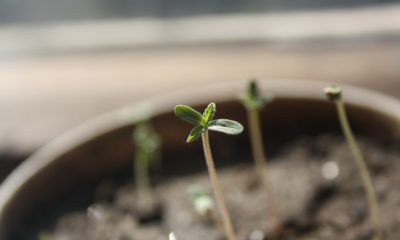
Cultivation
The Heroes’ Journey
The road to becoming one of the most acclaimed cultivators in Oregon involves adventure, crisis and transformation.
In the foothills of Mt. Hood, Oregon’s tallest mountain and most active volcano, lies an unexpected ganja gold mine. Surrounded by towering fir trees and cascading streams, I arrive on an early autumn evening at the “Heroes Compound” to meet the esteemed cannabis breeder and cultivator, Patrick Pooler.
“This place was a massive trash pile when I first started working on it in 2010,” Pooler recalls. “The people before us had been scrapping cars and cooking meth. You can imagine the mess they left behind.”
From the meticulously manicured grounds around me, it’s hard to imagine the wasteland this 107-acre parcel once was. Pooler says their cleanup efforts are what gained him and his crew their namesake, Heroes of the Farm.
“It was actually one of the previous owners that gave us the name,” Pooler says. “It’s what she called us after she saw all the work we put into this place. The name just stuck.”
Wandering around the property is an enchanting expedition. We pass clusters of automated light-deprivation greenhouses, nine in total, and into a multi-room, fully flowering indoor operation. The sparkling clean facility holds a perfectly packed canopy of glittering colas under a hundred or so lights.
We continue the tour to visit mother rooms and breeding chambers, where we pass vats of bubbling compost teas, high-tech potting machines and soil steamers. A colorful sunset transforms the expansive skyline to our west and the sun’s last rays fade on the perpetually snow-capped summit of Mt. Hood protruding to the east. It feels like a dream world.
According to Pooler, transforming the hillside property into a world-class production and breeding facility involved removing metric tons of trash, terracing multiple acres of land and securing a three-year, million-dollar power upgrade. Every step, he says, was another massive hurdle to overcome. But this property’s progress adds up to only a small piece of the Heroes’ journey.

Crossing the Threshold
Pooler says his roots in the industry go back 14 years to a small closet grow at his home in Portland. From there, he escalated rapidly from small-scale medicinal cannabis provider to a lauded industry leader, with a passion for the plant and his community as his only guide.
He gained initial attention as a breeder, creating a slew of notable strains such as Conspiracy Kush, Marionberry Kush and Galactic Jack and working for a few years with the established breeders behind TGA Genetics.
In 2017, he jumped headfirst into Oregon’s recreational market, launching the Heroes brand to the public. His newer strain creations like Gorilla Snacks, Guinness, 8541 and Headdog instantly created a buzz among cannabis consumers and critics across the state, with fiercely potent, terpene-rich flowers boasting unbeatable bag appeal.
The company now consists of around 34 full-time staff members at multiple production facilities across the state, along with a licensed extraction lab, kitchen, dispensary and a wholesale distribution center.
In an ever-changing and challenging regulated cannabis market, Pooler admits he may have moved forward a little too quickly. His carefree cash-rich days of the past are replaced with crippling debt and relentless stress.
The Road of Trials
“I’ve always just kept on pushing, kept on scaling up,” Pooler says. “But I really wasn’t prepared for the huge overhead of the recreational market, especially as per pound prices crumbled.”
Even with a record of consistently selling out of flower, drop after drop, Pooler says he was forced to scale down his operations in November of 2018 and take a different approach. Instead of pushing large volumes of product into a flooded market, the company now focuses solely on top-shelf indoor.
“We are probably one of the few farms in the state that has a hard time keeping our products on dispensary shelves,” Pooler says. “We are proud to be surviving in one of the toughest markets in the nation.”
Pooler says the most important ingredients for quality flower are “the genetics, nutrients, and the farmer.”
“First and foremost are the genetics. I’ve spent the last 14 years hunting and breeding what I consider elite genetics. Over the last three years we’ve had more than 7,000 phenos we’ve selected from about fifty varieties of cannabis, so the search for new fire never stops,” he says. “As far as nutrients, I could give you my recipe right now [he uses only the Oregon-made Nectar for the Gods], but without the right farmer you just can’t get the same results. Each person that works here cares just as much, if not more than I do about what the finished product turns out like.”
Pooler added that he no longer offers budget flower or anything he considers to be an inferior product.
“I was selling discounted pounds to a few dispensaries, but then had complaints from customers,” Pooler says. “The dispensaries had turned around and sold the flower at the top shelf price and the customers thought we were ripping them off. It’s just not worth it, we have a reputation to uphold.”

Reaching Apotheosis
In 2018, just before he turned 33, Pooler says he reached what he would call his rock bottom.
“I owed everyone from my good friends to Uncle Sam a big chunk of money,” he says. “I was blaming everyone else for the problems I was facing, but in the end I just had to take things into my own hands and change my future.”
Pooler says the first thing he took into account was his health, taking on an ambitious exercise regimen, giving up alcohol, smoking less weed and picking up a reading habit for the first time in his life.
He then took aim at changing his surroundings. With a rocky relationship with his county that included getting zoned out of several costly properties for extraction facilities, Pooler and his crew joined in the dialogue. They started showing up to council meetings, organized community service and cleanup events and became familiar faces to their neighbors, many of whom ardently opposed the cannabis industry.
“I started inviting the community over for tours,” Pooler says. “People were asking questions like, ‘Will I get high from the smell,’ and ‘Are you in a cartel?’ All I could tell them was that I’d be a whole lot richer if either were true. They may not love what we are doing up here, but now they respect us, and know we are here for the long haul.”
With a steady supply of new genetics about to hit the market and freshly licensed facilities coming online after years of investment, Pooler says he’s optimistic again.
Like the heroes of yore, he has emerged from the belly of the whale, walked through the ring of fire, reached that personal pinnacle your English teacher called apotheosis — or whatever metaphor floats your boat — and emerged ready for the future of the Heroes of Farm.
TELL US, would you work on a cannabis farm?


























